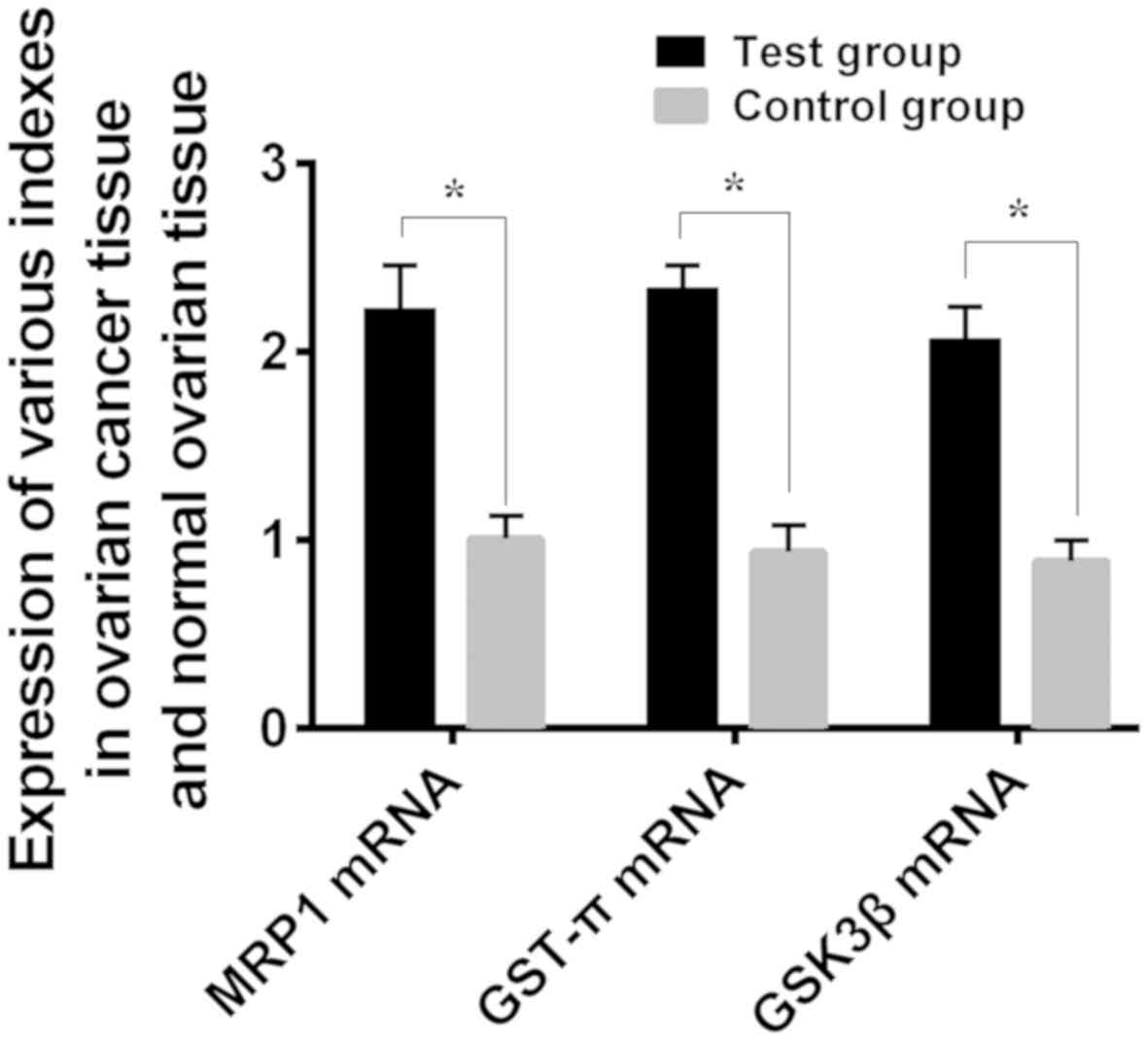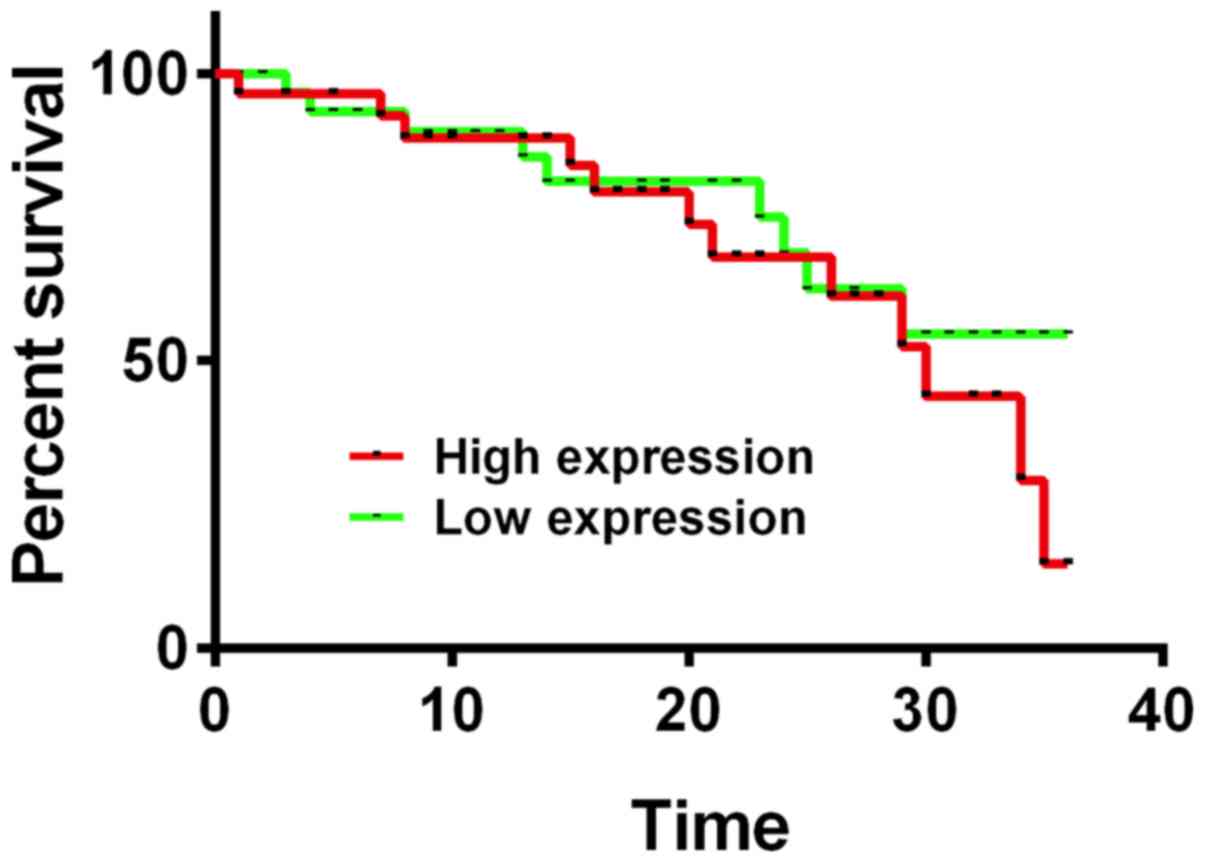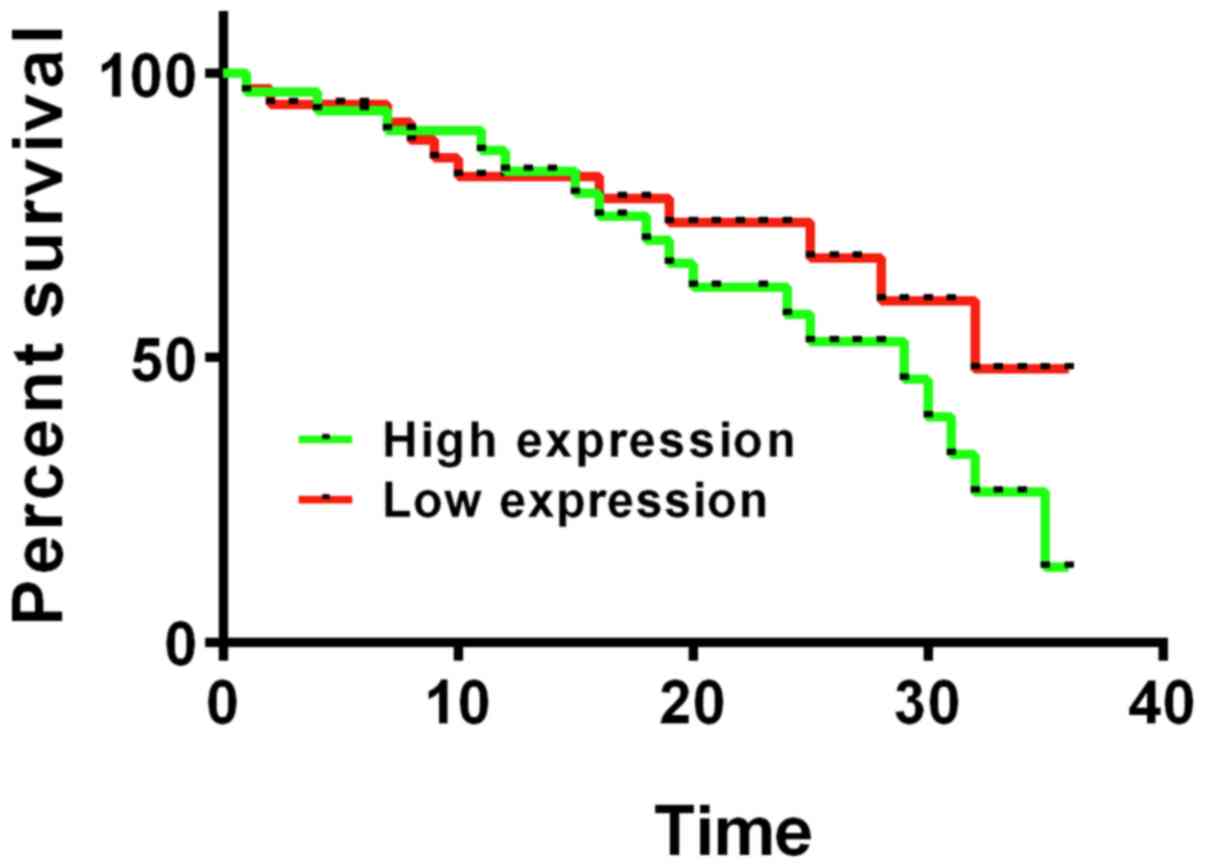|
1
|
Jacobs IJ, Menon U, Ryan A, Gentry-Maharaj
A, Burnell M, Kalsi JK, Amso NN, Apostolidou S, Benjamin E,
Cruickshank D, et al: Ovarian cancer screening and mortality in the
UK Collaborative Trial of Ovarian Cancer Screening (UKCTOCS): A
randomised controlled trial. Lancet. 387:945–956. 2016. View Article : Google Scholar : PubMed/NCBI
|
|
2
|
Duran GE, Wang YC, Moisan F, Francisco EB
and Sikic BI: Decreased levels of baseline and drug-induced tubulin
polymerisation are hallmarks of resistance to taxanes in ovarian
cancer cells and are associated with epithelial-to-mesenchymal
transition. Br J Cancer. 116:1318–1328. 2017. View Article : Google Scholar : PubMed/NCBI
|
|
3
|
Chen FQ, Zhang JM, Fang XF, Yu H, Liu YL,
Li H, Wang YT and Chen MW: Reversal of paclitaxel resistance in
human ovarian cancer cells with redox-responsive micelles
consisting of α-tocopheryl succinate-based polyphosphoester
copolymers. Acta Pharmacol Sin. 38:859–873. 2017. View Article : Google Scholar : PubMed/NCBI
|
|
4
|
Wu W, Fan L, Bao Z, Zhang Y, Peng Y, Shao
M, Xiang Y, Zhang X, Wang Q and Tao L: The cytoplasmic
translocation of Cx32 mediates cisplatin resistance in ovarian
cancer cells. Biochem Biophys Res Commun. 487:292–299. 2017.
View Article : Google Scholar : PubMed/NCBI
|
|
5
|
Huang ZL, Cao X, Luo RZ, Chen YF, Zhu LC
and Wen Z: Analysis of ERCC1, BRCA1, RRM1 and TUBB3 as predictors
of prognosis in patients with non-small cell lung cancer who
received cisplatin-based adjuvant chemotherapy: A prospective
study. Oncol Lett. 11:299–305. 2016. View Article : Google Scholar : PubMed/NCBI
|
|
6
|
Stott W, Campbell S, Franchini A, Blyuss
O, Zaikin A, Ryan A, Jones C, Gentry-Maharaj A, Fletcher G, Kalsi
J, et al: Sonographers' self-reported visualization of normal
postmenopausal ovaries on transvaginal ultrasound is not reliable:
Results of expert review of archived images from UKCTOCS.
Ultrasound Obstet Gynecol. 51:401–408. 2018. View Article : Google Scholar : PubMed/NCBI
|
|
7
|
Thomas DS, Fourkala EO, Apostolidou S,
Gunu R, Ryan A, Jacobs I, Menon U, Alderton W, Gentry-Maharaj A and
Timms JF: Evaluation of serum CEA, CYFRA21-1 and CA125 for the
early detection of colorectal cancer using longitudinal preclinical
samples. Br J Cancer. 113:268–274. 2015. View Article : Google Scholar : PubMed/NCBI
|
|
8
|
Niiro E, Morioka S, Iwai K, Yamada Y,
Ogawa K, Kawahara N and Kobayashi H: Potential signaling pathways
as therapeutic targets for overcoming chemoresistance in mucinous
ovarian cancer. Biomed Rep. 8:215–223. 2018.PubMed/NCBI
|
|
9
|
Abdallah EA, Fanelli MF, Souza E Silva V,
Machado Netto MC, Gasparini Junior JL, Araújo DV, Ocea LM, Buim ME,
Tariki MS, Alves VS, et al: MRP1 expression in CTCs confers
resistance to irinotecan-based chemotherapy in metastatic
colorectal cancer. Int J Cancer. 139:890–898. 2016. View Article : Google Scholar : PubMed/NCBI
|
|
10
|
Yang X, Leslie G, Gentry-Maharaj A, Ryan
A, Intermaggio M, Lee A, Kalsi JK, Tyrer J, Gaba F, Manchanda R, et
al: Evaluation of polygenic risk scores for ovarian cancer risk
prediction in a prospective cohort study. J Med Genet. 55:546–554.
2018. View Article : Google Scholar : PubMed/NCBI
|
|
11
|
Jenkins V, Fallowfield L, Langridge C,
Barrett J, Ryan A, Jacobs I, Kilkerr J, Menon U and Farewell V:
Psychosocial factors associated with withdrawal from the United
Kingdom Collaborative Trial of Ovarian Cancer Screening after 1
episode of repeat screening. Int J Gynecol Cancer. 25:1519–1525.
2015. View Article : Google Scholar : PubMed/NCBI
|
|
12
|
Basak P, Sadhukhan P, Sarkar P and Sil PC:
Perspectives of the Nrf-2 signaling pathway in cancer progression
and therapy. Toxicol Rep. 4:306–318. 2017. View Article : Google Scholar : PubMed/NCBI
|
|
13
|
Livak KJ and Schmittgen TD: Analysis of
relative gene expression data using real-time quantitative PCR and
the 2(-Delta Delta C(T)) method. Methods. 25:402–408. 2001.
View Article : Google Scholar : PubMed/NCBI
|
|
14
|
Yao HP: Diagnosis and treatment of
recurrent ovarian cancer. Zhonghua Fu Chan Ke Za Zhi. 38:659–660.
2003.(In Chinese). PubMed/NCBI
|
|
15
|
Gizzo S, Noventa M, Quaranta M, Vitagliano
A, Saccardi C, Litta P and Antona D: A novel hysteroscopic approach
for ovarian cancer screening/early diagnosis. Oncol Lett.
13:549–553. 2017. View Article : Google Scholar : PubMed/NCBI
|
|
16
|
Ataie-Kachoie P, Pillai K, Badar S, Akhter
J and Morris DL: Monepantel considerably enhances the therapeutic
potentials of PEGylated liposomal doxorubicin and gemcitabine in
ovarian cancer: In vitro and in vivo studies. Am J Cancer Res.
8:2064–2075. 2018.PubMed/NCBI
|
|
17
|
Qin M, Jin Y, Ma L, Zhang YY and Pan LY:
The role of neoadjuvant chemotherapy followed by interval debulking
surgery in advanced ovarian cancer: A systematic review and
meta-analysis of randomized controlled trials and observational
studies. Oncotarget. 9:8614–8628. 2017.PubMed/NCBI
|
|
18
|
Senft D, Qi J and Ronai ZA: Ubiquitin
ligases in oncogenic transformation and cancer therapy. Nat Rev
Cancer. 18:69–88. 2018. View Article : Google Scholar : PubMed/NCBI
|
|
19
|
Zhang KG, Qin CY, Wang HQ, Wang JX and
Wang QM: The effect of TRAIL on the expression of multidrug
resistant genes MDR1, LRP and GST-π in drug-resistant gastric
cancer cell SGC7901/VCR. Hepatogastroenterology. 59:2672–2676.
2012.PubMed/NCBI
|
|
20
|
Menon U, McGuire AJ, Raikou M, Ryan A,
Davies SK, Burnell M, Gentry-Maharaj A, Kalsi JK, Singh N, Amso NN,
et al: The cost-effectiveness of screening for ovarian cancer:
Results from the UK Collaborative Trial of Ovarian Cancer Screening
(UKCTOCS). Br J Cancer. 117:619–627. 2017. View Article : Google Scholar : PubMed/NCBI
|
|
21
|
Sedláková I, Laco J, Tošner J, Spaček J
and Cermáková E: Drug resistance proteins LRP, Pgp, MRP1, MRP3 and
MRP5 in ovarian cancer patients. Ceska Gynekol. 78:545–553.
2013.(In Czech). PubMed/NCBI
|
|
22
|
Ji Q and Qiu L: Mechanism study of
PEGylated polyester and β-cyclodextrin integrated micelles on drug
resistance reversal in MRP1-overexpressed HL60/ADR cells. Colloids
Surf B Biointerfaces. 144:203–213. 2016. View Article : Google Scholar : PubMed/NCBI
|
|
23
|
Fallowfield L, Solis-Trapala I, Menon U,
Langridge C, May S, Jacobs I and Jenkins V: The effect of ovarian
cancer screening on sexual activity and functioning: Results from
the UK collaborative trial of ovarian cancer screening RCT. Br J
Cancer. 116:1111–1117. 2017. View Article : Google Scholar : PubMed/NCBI
|
|
24
|
Cao DY, Shen K, Yang JX and Guan J: The
expression of MRP, GST-pi, Topo IIalpha and COX-2 in epithelial
ovarian cancer and its relationship to drug resistance and
prognosis. Zhonghua Yi Xue Za Zhi. 87:1738–1741. 2007.(In Chinese).
PubMed/NCBI
|
|
25
|
Russell MR, Graham C, D'Amato A,
Gentry-Maharaj A, Ryan A, Kalsi JK, Ainley C, Whetton AD, Menon U,
Jacobs I, et al: A combined biomarker panel shows improved
sensitivity for the early detection of ovarian cancer allowing the
identification of the most aggressive type II tumours. Br J Cancer.
117:666–674. 2017. View Article : Google Scholar : PubMed/NCBI
|
|
26
|
Beurel E, Kornprobst M, Blivet-Van
Eggelpoël MJ, Cadoret A, Capeau J and Desbois-Mouthon C: GSK-3beta
reactivation with LY294002 sensitizes hepatoma cells to
chemotherapy-induced apoptosis. Int J Oncol. 27:215–222.
2005.PubMed/NCBI
|
|
27
|
Farago M, Dominguez I, Landesman-Bollag E,
Xu X, Rosner A, Cardiff RD and Seldin DC: Kinase-inactive glycogen
synthase kinase 3beta promotes Wnt signaling and mammary
tumorigenesis. Cancer Res. 65:5792–5801. 2005. View Article : Google Scholar : PubMed/NCBI
|

















